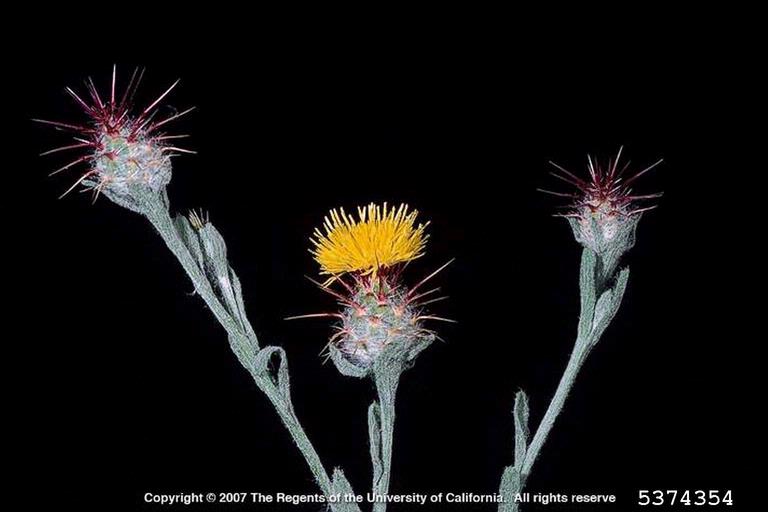Maltese Starthistle

Maltese Starthistle
(Centaurea melitensis)
Priority: - Prevent / EDRR
Tags: Agricultural | EDRR | Biocontrol
Identification and Reproduction
Identification:
- Maltese starthistle, also known as Malta starthistle can grow up to 0.7 m tall.
- Stems are erect, winged, ridged and branched.
- It produces lance-shaped leaves that are toothed and spiny hairs. With maturity hairs will appear cobwebby.
- Flowers appear solitary or in clusters of 2-5 at the end of branches. Short disc flowers are bright yellow and encased in straw coloured bracts bearing spines.
- Flowers bloom from July and September, seeds ripen by October.
Reproduction:
- Reproduces by seed.
- Often transported by hitching a ride on humans, livestock and contaminating soil, crop seed and hay.
Habitat & Ecology
- Usually invades open, disturbed areas such as roadsides, rangelands, pasutres and cultivated fields.
- Adapted to all soil textures and nutrient poor sites.
- It is shade intolerant but drought tolerant.
- This plant is prone to taking over recently burned sites.
Impacts
Social:
- Common contaminant of cereal grains.
- Also known to contaminate wool harvests.
- Displaces native foraging species.
- Can cause injury to grazing livestock as they are covered in spines.
Ecological:
- When found in large infestations with deplete water sources and natives species will experience droughty conditions.
Management
Prevention is a high priority for this plant.
- Please report this weed if you think you have seen it.
- Thoroughly clean clothing, livestock, equipment and vehicles after traveling through an infested site.
- Use certified hay, straw, mulch and seed mixtures.
Resources
For more details check out the Invasive Species Compendium datasheet on Centaurea melitensis.
The United States Department of Agriculture provides a Field Guide for Managing Malta Starthistle in the Southwest here. Please note that this is a US resource and Canadian guidelines and regulations may differ. Be sure to read labels prior to use.
Header photo (Forest and Kim Starr).



